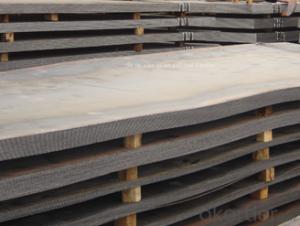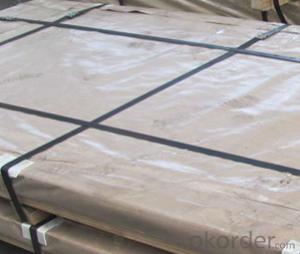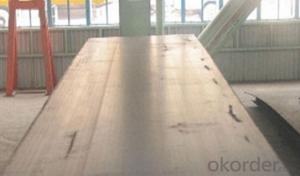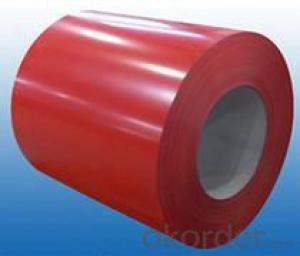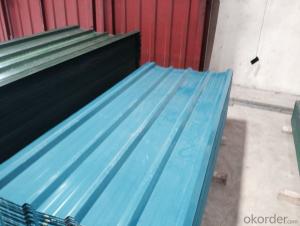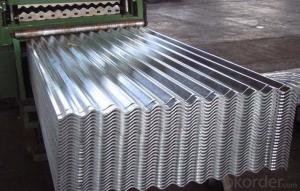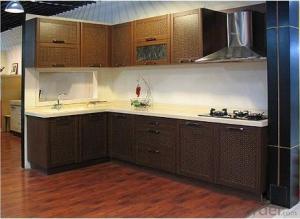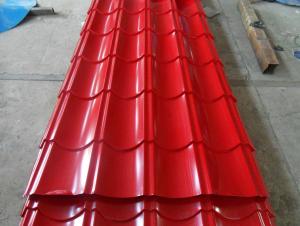Hot Rolled Carbon Steel Sheet G3101 CNBM
- Loading Port:
- Qingdao
- Payment Terms:
- TT OR LC
- Min Order Qty:
- 10 pc
- Supply Capability:
- 30 pc/month
OKorder Service Pledge
Quality Product, Order Online Tracking, Timely Delivery
OKorder Financial Service
Credit Rating, Credit Services, Credit Purchasing
You Might Also Like
Quick Details
| Standard: | AISI, ASTM, DIN, GB, JIS | Grade: | A572,A573,A633,A678,A709,A710,G3101,G3136,etc | Thickness: | 1mm-200mm |
| Brand Name: | SHOU GANG GROUP, AN STEEL | Model Number: | Q235 | ||
| Type: | Steel Plate | Technique: | Hot Rolled | Surface Treatment: | Coated |
| Application: | widely | Special Use: | High-strength Steel Plate | Width: | 1000mm-3000mm |
| Length: | 1000mm-12000mm | Price Term: | FOB CIF CFR |
Packaging & Delivery
| Packaging Details: | standard seaworthy export packing or as the request of customers |
| Delivery Detail: | 10 days after deposit or according to customers' quantity |
Specifications
hot rolled carbon steel sheet
1.Thickness:1mm-200mm
2.Length:1000mm-12000mm
3.Width:1000mm-2000mm
hot rolled carbon steel sheet
| Product | HR steel plate prices carbon steel plate prices per kg |
| MOQ | 25 ton |
| Thickness | 1mm-200mm |
| Width | 1000mm-3000mm |
| Length | 1000mm-12000mm |
| Application | widely |
| Standard | AISI,ASTM,BS,DIN,JIS,GB,etc |
| Grade | A572,A573,A633,A678,A709,A710,G3101,G3136,etc |
| Tpye | Steel plate |
| Surfacing | Coated |
| Productive Technology | Hot Rolled & Cold Rolled |
| Port | |
| Payment Terms | L/C,T/T,Western Union,MoneyGram |
| Product Ability | 5000 tons per month |
| Delivery | 10 days after deposit or according to customers' quantity |
| Packing | standard seaworthy export packing or as the request of customers |
- Q:Are steel sheets suitable for water storage tanks?
- Yes, steel sheets are suitable for water storage tanks. Steel has high strength and durability, making it an ideal material for storing water. It is resistant to corrosion and can withstand various weather conditions, making it a reliable choice for long-term water storage. Additionally, steel tanks can be easily constructed and maintained, providing a cost-effective solution for water storage needs.
- Q:How do steel sheets compare to other materials like aluminum or stainless steel?
- Steel sheets have several advantages over other materials like aluminum or stainless steel. Firstly, steel sheets are generally much stronger and more durable than aluminum or stainless steel sheets. This makes them ideal for applications that require high strength and resistance to wear and tear. Secondly, steel sheets are more cost-effective compared to stainless steel sheets. Steel is usually less expensive to produce and purchase, making it a more economical choice for many industries. Additionally, steel sheets can be easily recycled, further reducing their overall cost and environmental impact. On the other hand, aluminum sheets are lighter in weight than steel sheets, which can be advantageous in certain applications where weight is a concern, such as in the aerospace industry. Aluminum is also naturally resistant to corrosion, making it a suitable choice for outdoor applications or environments with high humidity. Stainless steel sheets, on the other hand, are highly resistant to corrosion and staining, making them ideal for applications where hygiene and aesthetics are important, such as in the food and medical industries. Stainless steel sheets also have excellent heat resistance properties, making them suitable for high-temperature applications. In summary, steel sheets offer superior strength and durability compared to aluminum or stainless steel sheets, while also being more cost-effective. However, aluminum and stainless steel sheets have their own unique properties that make them suitable for specific applications. The choice between these materials ultimately depends on the specific requirements and constraints of the project or industry.
- Q:Why can iron and steel stick with glue?
- This kind of synthetic resin adhesive has the metal or non-metallic materials sticking to the prison so, partly because the adhesive into the plastic surface of the pores, forming a mechanism combination; on the other hand is because the adhesive and plastic surface chemistry, the molecular junction.
- Q:What are the different grades of steel sheets?
- There are several different grades of steel sheets, including low carbon steel, high carbon steel, stainless steel, galvanized steel, and alloy steel. Each grade has unique properties and is used for specific applications based on its strength, durability, corrosion resistance, and other factors.
- Q:Are steel sheets suitable for manufacturing elevator doors?
- Steel sheets are indeed appropriate for the production of elevator doors. The strength, durability, and aesthetic charm of steel make it a popular preference for elevator doors. Steel sheets possess the essential strength and rigidity needed for elevator doors, ensuring safety and security. Furthermore, steel is resistant to wear and tear, corrosion, and fire, rendering it a dependable material for elevator doors. Steel sheets can also be easily tailored and completed to meet diverse design specifications, granting a wide array of styles and finishes. In conclusion, steel sheets possess the necessary attributes for the manufacturing of elevator doors, making them a fitting selection for this purpose.
- Q:What is the cost of a standard steel sheet?
- The cost of a standard steel sheet can vary depending on factors such as size, thickness, and market conditions. It is advisable to check with suppliers or conduct market research to get accurate pricing information.
- Q:What is the minimum order quantity for the steel sheets?
- The minimum order quantity for the steel sheets is 100 units.
- Q:What are the different types of steel sheet alloys?
- There are various types of steel sheet alloys, including carbon steel, stainless steel, galvanized steel, and alloy steel.
- Q:What are the different fastening options for steel sheets?
- Depending on the specific application and requirements, there are various fastening options available for steel sheets. Some commonly used fastening options for steel sheets include the following: 1. Screws: Steel sheets can be secured using screws, which are easily accessible and simple to use. Self-tapping screws are commonly employed to fasten steel sheets as they can create their own threads in the material. 2. Bolts and nuts: Bolts and nuts offer a robust and secure fastening choice for steel sheets. They are frequently utilized in situations where adjustability or removability is required. 3. Rivets: Rivets are permanent fasteners commonly used to join two or more steel sheets together. They are often preferred in applications where a watertight or airtight seal is necessary. 4. Welding: Welding is a widely used method for fastening steel sheets. It involves melting the edges of the sheets and joining them together. Welding provides a strong and durable connection but necessitates specialized equipment and expertise. 5. Adhesives: Certain adhesives, such as epoxy or structural adhesives, can be used to bond steel sheets together. Adhesives can create a clean and visually appealing connection, although their strength may vary depending on the specific adhesive used. 6. Clips and clamps: Clips and clamps are frequently employed to secure steel sheets in place. They can be easily installed and removed, making them a popular choice for temporary or adjustable fastening requirements. 7. Magnetic fasteners: Magnetic fasteners, such as magnetic strips or magnets with hooks, can be utilized to attach steel sheets to magnetic surfaces. This offers a convenient and user-friendly fastening option. When selecting a fastening option for steel sheets, it is crucial to consider factors such as strength, durability, ease of installation, and removal. Additionally, the specific requirements of the application, including load-bearing capacity and environmental conditions, should be taken into account to ensure the chosen fastening option is suitable for the intended purpose.
- Q:Are steel sheets resistant to chemicals?
- Yes, steel sheets are generally resistant to chemicals.
1. Manufacturer Overview |
|
|---|---|
| Location | |
| Year Established | |
| Annual Output Value | |
| Main Markets | |
| Company Certifications | |
2. Manufacturer Certificates |
|
|---|---|
| a) Certification Name | |
| Range | |
| Reference | |
| Validity Period | |
3. Manufacturer Capability |
|
|---|---|
| a)Trade Capacity | |
| Nearest Port | |
| Export Percentage | |
| No.of Employees in Trade Department | |
| Language Spoken: | |
| b)Factory Information | |
| Factory Size: | |
| No. of Production Lines | |
| Contract Manufacturing | |
| Product Price Range | |
Send your message to us
Hot Rolled Carbon Steel Sheet G3101 CNBM
- Loading Port:
- Qingdao
- Payment Terms:
- TT OR LC
- Min Order Qty:
- 10 pc
- Supply Capability:
- 30 pc/month
OKorder Service Pledge
Quality Product, Order Online Tracking, Timely Delivery
OKorder Financial Service
Credit Rating, Credit Services, Credit Purchasing
Similar products
New products
Hot products
Hot Searches
Related keywords
